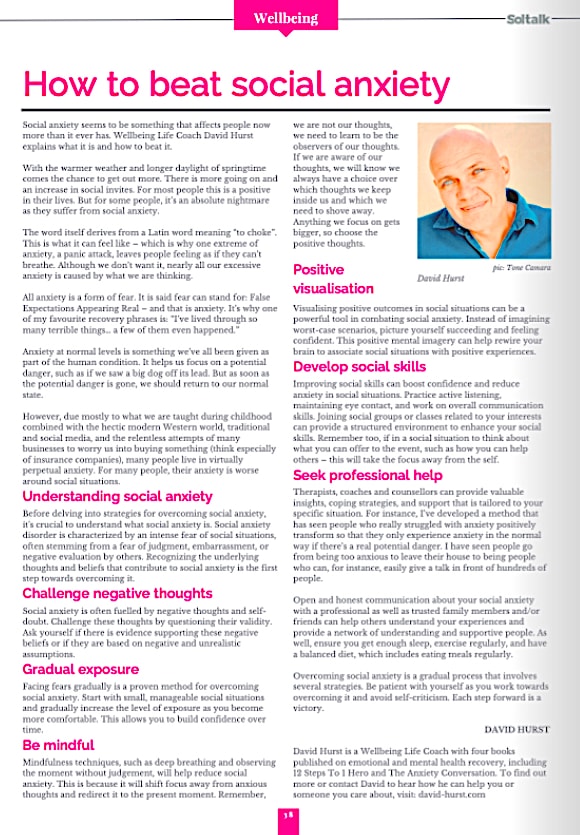How to beat social anxiety

Social anxiety is something that affects people now more than it ever has.
With the warmer weather and longer daylight of Springtime comes the chance to get out more. There is more going on and an increase in social invites.
For most people this is a positive to their lives. But for some people, it’s an absolute nightmare as they suffer from social anxiety.
The word “anxiety” derives from a Latin word meaning “to choke”. This is what it can feel like – which is why one extreme of anxiety, a panic attack, leaves people feeling as if they can’t breathe. Although we don’t want it, nearly all our excessive anxiety is caused by what we are thinking.
All anxiety is a form of fear. It is said fear can stand for: False Expectations Appearing Real – and that is anxiety. It’s why one of my favourite recovery phrases is: “I’ve lived through so many terrible things… a few of them even happened.”
Anxiety at normal levels is something we’ve all been given as part of the human condition. It helps us focus on a potential danger, such as if we saw a big dog off its lead. But as soon as the potential danger is gone, we should return to our normal state.
However, due mostly to what we are taught during childhood combined with the hectic modern Western world, traditional and social media, and the relentless attempts of many businesses to worry us into buying something (think especially of insurance companies), many people live in virtually perpetual anxiety. For many people, their anxiety is worse around social situations.
Understanding social anxiety
Before delving into strategies for overcoming social anxiety, it’s crucial to understand what social anxiety is. Social anxiety disorder is characterized by an intense fear of social situations, often stemming from a fear of judgment, embarrassment, or negative evaluation by others. Recognizing the underlying thoughts and beliefs that contribute to social anxiety is the first step towards overcoming it.
Challenge negative thoughts
Social anxiety is often fuelled by negative thoughts and self-doubt. Challenge these thoughts by questioning their validity. Ask yourself if there is evidence supporting these negative beliefs or if they are based on negative and unrealistic assumptions.
Gradual exposure
Facing fears gradually is a proven method for overcoming social anxiety. Start with small, manageable social situations and gradually increase the level of exposure as you become more comfortable. This allows you to build confidence over time.
Be mindful
Mindfulness techniques, such as deep breathing and observing the moment without judgement, will help reduce social anxiety. This is because it will shift focus away from anxious thoughts and redirect it to the present moment. Remember, we are not our thoughts, we need to learn to be the observers of our thoughts. If we are aware of our thoughts, we will know we always have a choice over which thoughts we keep inside us and which we need to shove away. Anything we focus on gets bigger, so choose the positive thoughts.
Positive visualisation
Visualising positive outcomes in social situations can be a powerful tool in combating social anxiety. Instead of imagining worst-case scenarios, picture yourself succeeding and feeling confident. This positive mental imagery can help rewire your brain to associate social situations with positive experiences.
Develop social skills
Improving social skills can boost confidence and reduce anxiety in social situations. Practice active listening, maintaining eye contact, and work on overall communication skills. Joining social groups or classes related to your interests can provide a structured environment to enhance your social skills. Remember too, if in a social situation to think about what you can offer to the event, such as how you can help others – this will take the focus away from the self.
Seek professional help
Therapists, coaches and counsellors can provide valuable insights, coping strategies, and support that is tailored to your specific situation. For instance, I’ve developed a method that has seen people who really struggled with anxiety positively transform so that they only experience anxiety in the normal way if there’s a real potential danger. I have seen people go from being too anxious to leave their house to being people who can, for instance, easily give a talk in front of hundreds of people.
Open and honest communication about your social anxiety with a professional as well as trusted family members and/or friends can help others understand your experiences and provide a network of understanding and supportive people. As well, ensure you get enough sleep, exercise regularly, and have a balanced diet, which includes eating meals regularly.
Overcoming social anxiety is a gradual process that involves several strategies. Be patient with yourself as you work towards overcoming it and avoid self-criticism. Each step forward is a victory.

My latest article for Soltalk magazine.
